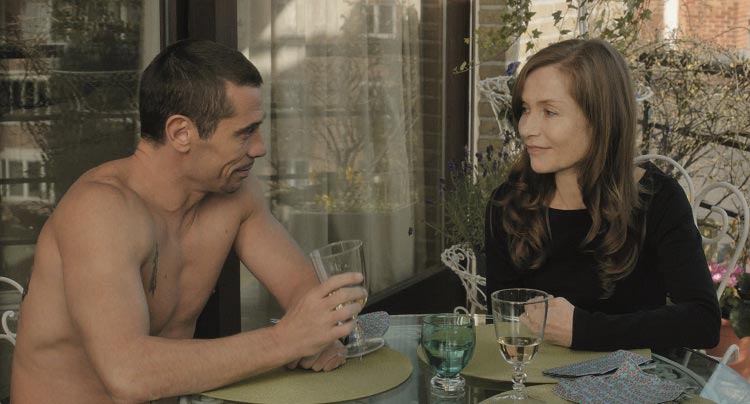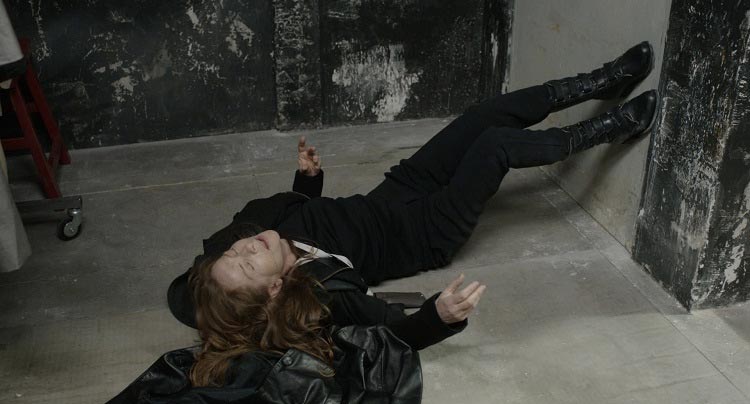
Abuse of Weakness shows it’s a contradiction well worth exploring.

Abuse of Weakness shows it’s a contradiction well worth exploring.
In 2004, Catherine Breillat suffered a massive cerebral hemorrhage, triggering a stroke that paralyzed half of her body. She eventually recovered, and after getting back to filmmaking she met Christophe Rocancourt, a notorious con artist. Breillat wanted Rocancourt to star in the lead role of her new film, and in the development process Rocancourt convinced Breillat to give him over 700,000 Euros. Rocancourt was eventually convicted for scamming the filmmaker out of her savings, and Breillat wrote about her experiences in a novel. Now Breillat has adapted her book into Abuse of Weakness, a film that dives into the complex relationship between herself and the man who swindled her.
But don’t take the film as entirely autobiographical; Breillat clarifies from the beginning that Abuse of Weakness is more of a quasi-fiction than a straight retelling of what happened. Taking Breillat’s place is Maud (Isabelle Huppert) who, as the film opens, has a stroke while in bed. Breillat’s camera is unforgiving as it shows Maud try to regain the ability to speak, walk and even laugh. It’s a brief but powerful segment in the film, made all the more effective by Huppert throwing herself completely into the role.

Eventually Maud recovers, relying on a cane to get around. While watching TV one night she comes upon an interview with Vilko (Kool Shen), a former con man promoting a book about his past crimes. Maud is immediately taken by his charisma and masculinity, and in the next scene she’s having him over at her place. Maud offers Vilko the lead role in her new film, and he accepts, telling her she’ll be seeing a lot more of him from now on.
Maud & Vilko’s relationship starts out strangely. Vilko turns up the charm considerably, while Maud playfully rejects his attempts to woo her. At one point he drops a large bag full of money in front of her, bragging about his government connections. Maud reacts with total indifference, causing Vilko to storm out. “To punish you, I won’t come for a month,” he says before leaving. Maud only pretends to not care about Vilko, but it’s clear she’s taken with him. It doesn’t take long before Vilko comes to her complaining of money troubles, and without any hesitation Maud starts writing out checks for her new friend.
Breillat prefers to dwell more on questions instead of providing any solutions. She doesn’t explain why Maud would hand over her savings to Vilko so easily, and nothing is revealed about Vilko’s reasons beyond his need for money. There are plenty of elements one can take as hints or suggestions for Maud’s behaviour. She’s only seen with co-workers or Vilko, implying a lack of any social life; her relationship with her family appears a distant one; and while Maud & Vilko’s relationship isn’t sexual, there are undercurrents of a master/slave situation going on between them. The lack of clear motivations shows how smart of a filmmaker Breillat is; the film is much more fascinating and watchable this way, with the psychological questions providing much of the film’s fuel.

The other major driving force belongs to Huppert and Shen’s performances. Huppert, one of the truly great French actresses, is startlingly convincing as Maud. Huppert commits herself physically to the role, and through her performance never makes Maud look like a victim. She complicates things further, much to the film’s benefit. Shen doesn’t meet the same standard as his superb co-star, but he does a great job as Vilko nonetheless. The two actors have great chemistry together, their unique interplay never making a single moment in the film ring false.
Early on in the film, someone asks Vilko how he was able to scam so many people out of money. His answer is simple: greed. People’s desire for more was the weakness Vilko could take advantage of. As Abuse of Weakness shows, it’s not nearly that simple with Maud. Time and time again she shows little concern with money. Vilko tells her about a restaurant she should invest in, promising her a big return. She looks bored during his pitch, telling him she doesn’t want to own a restaurant. So if greed doesn’t make Maud give away her money, what does? At the end of the film, as Maud’s family learns about what happened, they ask her the kind of pointed questions driving the film. Was she aware of what she was doing? Why did she hand the money away? Did she not know who she was giving her money to? Maud can only sum it up in one statement: “It was me, and it wasn’t me.” The line is one of the few times where it feels like Breillat is speaking directly to the audience. Perhaps Breillat still doesn’t know why she did it. It’s a paradoxical statement, but as Abuse of Weakness shows, it’s a contradiction well worth exploring.